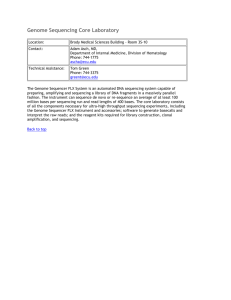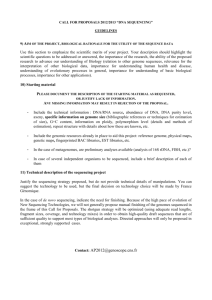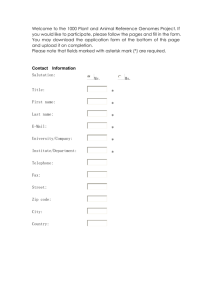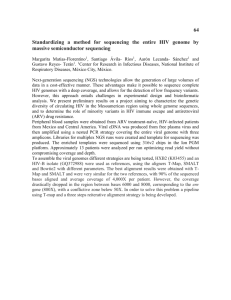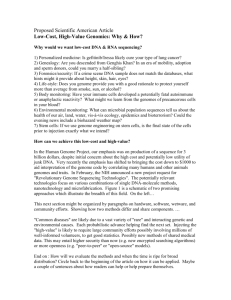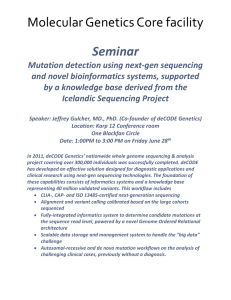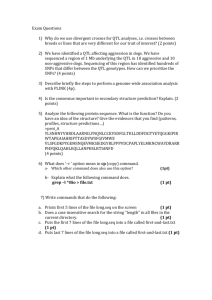Recent Technological Advances in Next-Generation Sequencing Kirby Siemering PhD Australian Genome Research Facility
advertisement
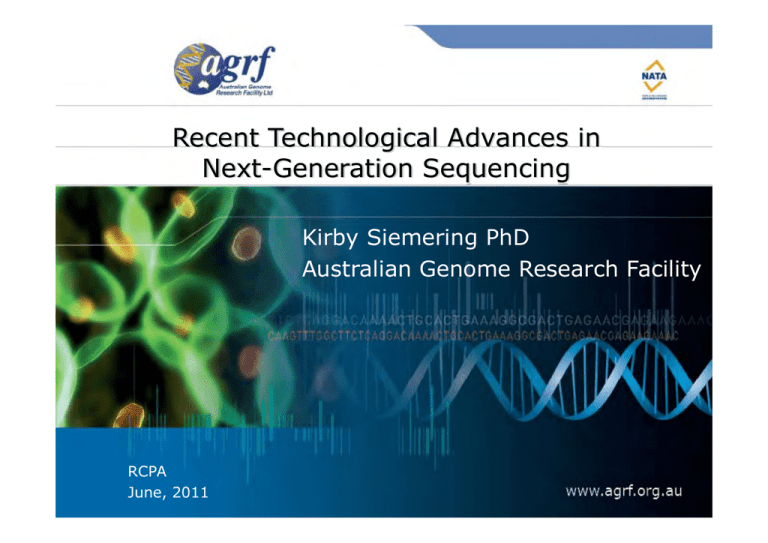
Recent Technological Advances in Next-Generation Sequencing Kirby Siemering PhD Australian Genome Research Facility RCPA June, 2011 Whole Genome Sequencing (WGS) Where have we been? 1953 – Structure of DNA solved 1977 – Sanger sequencing invented – First genome sequenced – ФX174 (5 kb) 1986 – First automated sequencing machine 1990 – Human Genome Project started 1992 – First “sequencing factory” at TIGR Whole Genome Sequencing (WGS) Where have we been? 1995 – First bacterial genome – H. influenzae (1.8 Mb) 1998 – First animal genome – C. elegans (97 Mb) 2003 – Completion of Human Genome Project (3 Gb) – 13 years – $2.7 bn 2005 – First “next-generation” sequencing instrument 2008 – 2356 genome sequences in NCBI database Whole Genome Sequencing (WGS) Where have we been? Where are we now? “Next Generation” Sequencing • Massively parallel DNA sequencing (not Sanger) • Up to 600 Gb sequence per run (1-2 weeks) = 6 human genomes at 30X coverage!! • $10-30K per run reagent cost • Limitations in read length and accuracy • 3 systems dominate market - Roche GS FLX (454) - Illumina HiSeq 2000 (Solexa) - AB SOLiD (Agencourt) Roche GS FLX sequencing technology gDNA fragment or PCR adapter ligation emulsion PCR sequence generation Illumina sequencing technology Robust Reversible Terminator Chemistry Foundation 3’ 5’ DNA (0.1-1.0 ug) A G C T G C T A C G A T A C C C G A T C G A T A T C G A T G C T Sample preparation Cluster growth 5’ Sequencing 1 2 3 4 5 6 7 8 9 T G C T A C G A T … Image acquisition Base calling Rapid Innovation Driving Cost Down Evolution of NGS system output Throughput (GB) 300 300GB 120 100 80 60 40 20 20GB 3GB 6GB 2007 2008 0 2009 2010 Cost per Human Genome Where are we now? Where are we going? The end of the current revolution? Where are we going? Archon X PRIZE Where are we going? Archon X PRIZE 100 human genomes at 99.999% accuracy in less than 10 days at a cost of <$10,000 per genome $10 million => Ultimate holy grail of “$1,000 genome” How to get there? Non-optical detection – Ion Torrent How to get there? Single Molecule Sequencing – Pacific Biosciences How to get there? Non-optical SMS – Oxford Nanopore So you can sequence human genomes But what does it all mean? NGS – feeding the discovery pipeline Discovery Validation Application MDx Where might this technology take us? Information convergance Where might this technology take us? GATTACA – food for thought…
